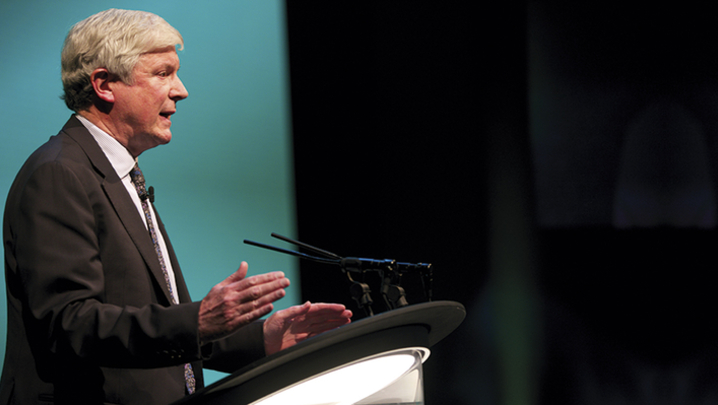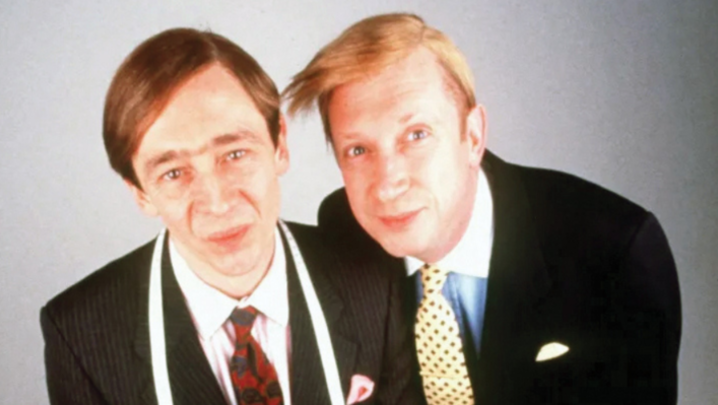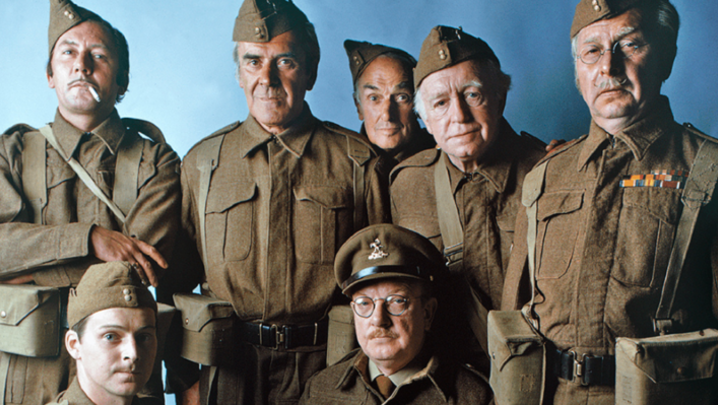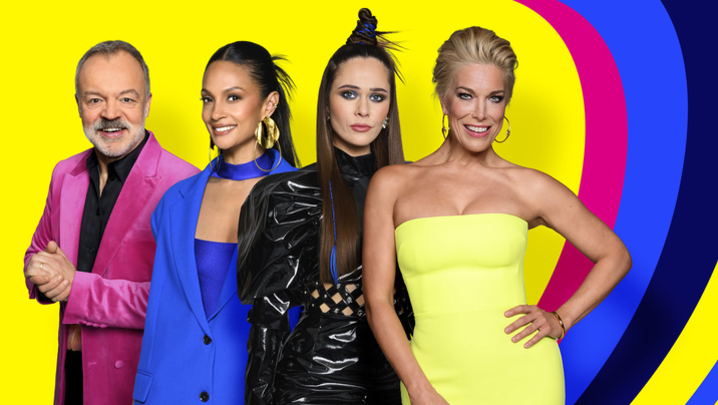Maggie Brown meets the recently promoted Mark Linsey, who must help steer BBC Television through the Charter chicane.
Mark Linsey’s career in television has progressed from producing An Audience with Freddie Starr to the heady heights of running BBC Television. As Acting Director of Television – following the abrupt departure of Danny Cohen – Linsey finds himself playing a critical part as Charter renewal gathers pace.
Ask how an executive with 30 years in entertainment shows might play such a crucial role, and this safe pair of hands reaches for the word “distinctive”.
This, after all, was the challenge issued to the BBC by a combative Secretary of State, John Whittingdale MP at the RTS Cambridge Convention in September.
Linsey continues: “There is the day-to-day job, monitoring output, the commissions… definitely, I’ll be taking the overview.
“I will be across all the high-profile things. Keeping everyone focused on the output, on the audience, making sure that we maintain our distinctiveness. Serving all parts of the audience with distinctive programmes.”
At BBC Television’s Christmas launch in November, he made the same point more passionately.
He dismissed as “balderdash” criticism that the corporation’s output lacks distinctiveness. He proved his point by refusing to enter a bidding war for The Voice UK.
As BBC Television’s Controller of Entertainment for the past seven years, Linsey’s ascent included responsibility for bedding in Cohen’s controversial 2011 acquisition of The Voice UK.
“He’s a gentleman and vastly experienced. An honest man, someone you can do business with.”
It was Linsey who insisted that the best bit, the rotating chairs, be a feature of every show. He also kept The Apprentice and Strictly Come Dancing fresh. Before that, he handled the replacement of Jonathan Ross in 2010 with The Graham Norton Show.
After missing out on the post of Controller of BBC One in 2013, he was appointed Cohen’s deputy. Linsey had already replaced George Entwistle as Head of Editorial Standards in 2011, where his job was to sort out flashpoints.
His initiatives included the swift publication of new guidelines covering the ownership of formats developed internally by BBC staff. This issue resurfaced again, with considerable disquiet during the development of Saturday-night show Prized Apart.
In his current role – which might be of indefinite duration – Linsey has oversight of: the critical waterfront of drama, under newish commissioner Polly Hill; scripted comedy; specialist factual; the new online BBC Three; the creation of BBC Studios; and implementing budget cuts.
The breadth of his portfolio concerns external and internal critics.
“Mark’s expertise is entertainment, very domestic, focused, it is one small area. He has not gone outside of light entertainment. International deals underpin most dramas, some documentaries and specialist factual,” says one senior broadcaster.
Another says: “We are used to there being these big beasts as Director of Television. Mark’s fallen into roles, he’s got promotions when no one else is around,” said another. “He’s not very strategic, or good at managing conflict. You can’t do that job by consensus – it’s leadership.”
Linsey takes these criticisms calmly when the comments are replayed to him. On the breadth point, he says: “A fair criticism. Without doubt, you learn a lot in this job, you learn a great deal. It’s one reason I’m enjoying it.
“I can be strategic. In seven years in charge of entertainment, I was incredibly strategic, looking at the bigger picture, delivering something for everyone.”
Sony executive and former BBC entertainment supremo Wayne Garvie observes: “He’s a gentleman and vastly experienced. An honest man, someone you can do business with.”
A respecter of craft skills, Linsey took the Heathrow Express to greet the Top Gear production team in October 2014 on their return from a controversial drive through Argentina.
Many Argentinians interpreted the number plate on Jeremy Clarkson’s Porsche as a triumphalist reference to the Falklands war, and the production team fled the country.
Linsey worked as a researcher on the earlier, pre-Clarkson Top Gear in 1986. “I’ve grown up through production, I have a huge regard for craft skills in this country,” he says, adding: “We should take more pride in them than we do, from research to the lighting, and producers who work really hard. They are wonderful, great people to spend time with.”
“Acting” Director of Television is a slightly ambiguous title. Linsey explains the deal: “I’ll be here for a few months more and we’re not sure what the post will be.” That is a reference to BBC Project King, which is about redesigning commissioning for the online/digital age, as outlined by Director-General Tony Hall in September.
No conclusions are anticipated before the spring, but the post of Director of Television may be subsumed into a more powerful Director of Content position, with genre commissioners reshaping programming.
In effect, Linsey notes, the job of Director of Television is already being halved, with the decision to float off BBC Studios. “I support it. It’s good for the BBC. Competition is good”.
The context for his promotion is that the BBC finds it difficult to recruit externally for top jobs.
The next few months include the return of Top Gear and the launch of a new Saturday-evening entertainment format on BBC One, Can’t Touch This. Like the current new series Getaway Car, it is a physical game show. They are both part of the increasingly tense hunt for a new entertainment hit, a challenge that the BBC shares with ITV.
The commitment to these programmes follows a succession of discarded commissions under Linsey: Don’t Scare the Hare, That Puppet Game Show, I Love My Country, Tumble, Reflex – and Prized Apart. Happily, his regime did strike lucky with comedians such as Michael McIntyre, Russell Howard and John Bishop.
The son of a primary school teacher and “modest” businessman, Linsey grew up glued to television. “Everything from Rising Damp to Nationwide. I wanted to get into it” as a producer, he says.
He was educated at Cambridgeshire High School for Boys and Hills Road Sixth Form College, Cambridge, and did a performing arts degree at Leicester Polytechnic.
Now 54, he is married to a yoga teacher. The couple have three sons and live in Sevenoaks.
Linsey broke into production through commercial radio, subsequently working at BBC Pebble Mill, Central TV and LWT. The last company was “the place to be for weekend entertainment”. There, he worked with “Nasty Nigel” – Nigel Lythgoe – and had a notable encounter with Freddie Starr.
“As Controller of Entertainment and Comedy at LWT, I asked Mark to produce An Audience with Freddie Starr in 1996,” Lythgoe recalls. “I knew he had the patience, common sense, fortitude and political nous to cope with the craziness and genius that was Freddie Starr, ingredients that would later serve him well at the BBC.
“The only hiccup was when Mark and Freddie had a disagreement about Freddie setting fire to his head.
“‘Freddie wants to set fire to his head,’ said an exasperated Mark. ‘What can we do?’”
“‘If Freddie wants to, let Freddie set fire to his head,’ was my best advice.
“Mark left my office shrugging his shoulders and shaking his head. I didn’t tell him that it was a trick I’d used previously, which involved a hood and a metal plate. I’d already discussed it with Freddie.
“He incorporated it, and it was hilarious. The show was truly one of his best. Mark and I insisted he rehearsed it.”
Linsey was turned down for a BBC entertainment post as “a bit too Dale Winton” before landing an executive role in 2007. In this job, he was responsible for mainstream studio entertainment and lottery shows.
Whatever 2016 brings, he says, Top Gear “is one we have to get right. I think we will. The world’s most popular programme and we are reskinning it.”
If the show succeeds, it might cement Linsey’s role, however transitional, as the boss of BBC Television.
How BBC TV’s new structure works
Mark Linsey says that it has been broadly ‘business as usual’ since the surprise abolition of BBC channel controllers was announced last month.
The move, designed to save money, saw the promotion of BBC One Controller Charlotte Moore to Controller of Television Channels and iPlayer. She still reports to Mark Linsey.
For more than 50 years, BBC channel controllers were powerful figures. Their influence gradually diminished as more decision-making switched to genre commissioners.
Some of British TV’s most influential figures ran either BBC One or Two, including David Attenborough, Paul Fox, Michael Jackson, Lorraine Heggessey, Jane Root and Alan Yentob.
Under the new structure, controllers have been replaced by channel editors.
Interviewed by Broadcast, Linsey explained: ‘The whole point of it is that the flow of ideas and talent between channels can happen in a much simpler way.
‘They are complementing one another, not competing.’







